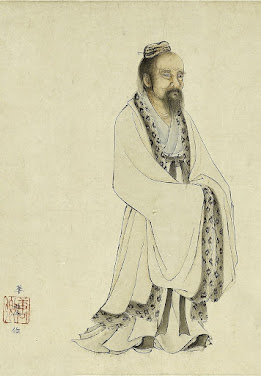Zhuangzi in a much later painting
plant it in Not-Even-Anything Village, or the field of Broad-and-Boundless, relax and do nothing by its side, or lie down for a free and easy sleep under it.
Cruz continues:
Zhuangzi lived in an extraordinarily vibrant and fertile period in the development of Chinese thought. These few centuries, referred to as the Warring States period, witnessed the growth of thinkers and schools of thought. . . . These were ‘disputers of the Dao’, who passionately debated the question: what is the good life?
Zhuangzi argued that we can reclaim our lives, and be happier and more fulfilled, if we become more useless. In this, he went against many influential thinkers of his time, such as the Mohists. These followers of Master Mo (c470-391 BCE) prized efficiency and welfare above all. They insisted on cutting away all ‘useless’ parts of life – art, luxury, ritual, culture, leisure, even the expression of emotions – and instead focused on ensuring that people across the social classes receive essential material resources. The Mohists viewed many practices common at the time as immorally wasteful. Rather than a funeral rich with rituals following tradition, such as burial within three layers of coffins and a years-long mourning period, Mohists recommended simply digging a pit deep enough so the body doesn’t smell. You were permitted to cry on your way to and from the burial site, but then you needed to return to work and life.
Although the Mohists wrote more than 2,000 years ago, their ideas sound familiar to modern ears. We frequently hear how we should avoid supposedly useless things, such as pursuing the arts, or a humanities education. Or it’s often said that we should allow for these things only insofar as they benefit the economy or human welfare. You might have felt this discomfort in your own life: the pressure from the meritocracy to serve some purpose, have some benefit, maximize some utility – that everything you do should be, in some sense, useful.
However, as we will show here, Zhuangzi offers an essential antidote to this pernicious means-ends way of thinking. He demonstrates that you can improve your life if you let go of the anxiety of wanting to serve a purpose. To be sure, Zhuangzi doesn’t altogether spurn usefulness. Rather, he argues that usefulness itself should not be life’s bottom line.
Daoism can be really annoying, but sometimes it helps to be reminded that the universe is very strange, our attempts to control it are bound to fail, and we should appreciate it for what it is.



No comments:
Post a Comment